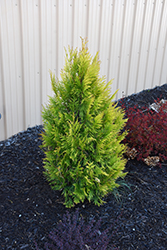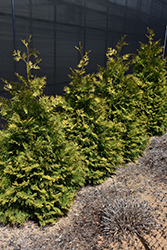It's all about ...
plants

Fluffy® Arborvitae
Thuja plicata 'SMNTPGF'
Height: 10 feet
Spread: 6 feet
Sunlight:
![]()
![]()
Hardiness Zone: 6a
Other Names: Western Arborvitae, Western Red Cedar
Brand: Proven Winners
Description:
A unique, pyramidal evergreen with soft, bold foliage that emerges yellow, giving a halo effect; the cheerful golden color persists, even in winter over the older darker green foliage; makes a wonderful color accent for the garden or landscape
Ornamental Features
Fluffy® Arborvitae is primarily valued in the landscape or garden for its distinctively pyramidal habit of growth. It has attractive gold-variegated lime green foliage with hints of chartreuse which emerges yellow in spring. The scale-like sprays of foliage are highly ornamental and turn harvest gold in the fall, which persists throughout the winter.
Landscape Attributes
Fluffy® Arborvitae is an evergreen tree with a strong central leader and a distinctive and refined pyramidal form. Its relatively fine texture sets it apart from other landscape plants with less refined foliage.
This is a relatively low maintenance tree. When pruning is necessary, it is recommended to only trim back the new growth of the current season, other than to remove any dieback. It has no significant negative characteristics.
Fluffy® Arborvitae is recommended for the following landscape applications;
- Accent
- Vertical Accent
- Hedges/Screening
Planting & Growing
Fluffy® Arborvitae will grow to be about 10 feet tall at maturity, with a spread of 6 feet. It has a low canopy, and is suitable for planting under power lines. It grows at a slow rate, and under ideal conditions can be expected to live for 80 years or more.
This tree does best in full sun to partial shade. It is quite adaptable, prefering to grow in average to wet conditions, and will even tolerate some standing water. This plant will benefit from an application of bonemeal and/or mycorrhizal fertilizer at the time of planting. It is not particular as to soil type or pH. It is somewhat tolerant of urban pollution, and will benefit from being planted in a relatively sheltered location. Consider applying a thick mulch around the root zone in winter to protect it in exposed locations or colder microclimates. This is a selection of a native North American species.
This plant is not reliably hardy in our region, and certain restrictions may apply; contact the store for more information.

